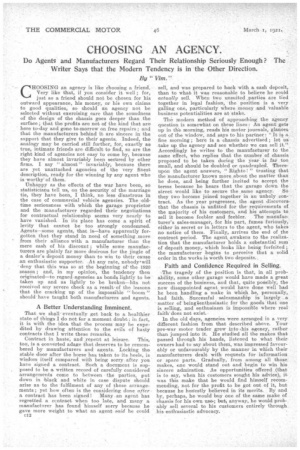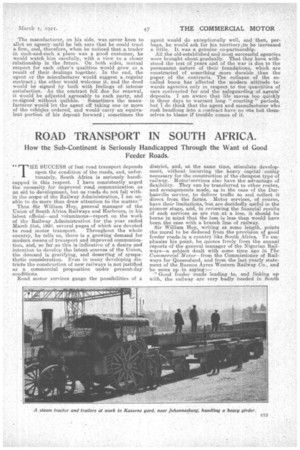CHOOSING AN AGENCY.
Page 16

Page 17

If you've noticed an error in this article please click here to report it so we can fix it.
Do Agents and Manufacturers Regard Their Relationship Seriously Enough ? The Writer Says that the Modern Tendency is in the Other Direction.
By" Vim."
CHOOSING an agency is like choosing a friend. • Very like that, if you consider it well ; for, just as a friend should not be chosen for his outward appearance, his money, or his own claims to good qualities, so should an agency not be ' selected without exercising care that the soundness of the design of the chassis goes deeper than the surface ; that the profits are not of the kind that are here to-day and gone to-morrow on free repairs ; and that the manufacturers behind it are sincere in the support that they give to their agents, Indeed, the analogy may be carried still further, for, exactly as true, intimate friends are difficult to find, so are the right kind of agencies not easy to come by, because they have almost invariably been secured by other firms. I say " almost" invariably, because there are yet unattached ageneieS of the very finest description, ready for the winning by any agent who is worthy of them.
Unhappy as the effects of the war have been, so statisticians tell us, on ther security of the. marriage tie, they have been, I think, no less disastrous in the case of commercial vehicle agencies. The oldtime seriousness with which the garage proprietor and the manufacturer regarded their negotiations for contractual relationship seems very nearlyto have vanished. In its place has come a spirit of levity that cannot be too strongly condemned. Agents—some agents, that is—have apparently forgotten that they stand in need of something more from their alliance with a manufacturer than the mere cash of his discount ; while some manufacturer a are plainly far more desirous for the jingle of a dealer's deposit money than to win to their cause an enthusiastic supporter. At .any rate, nobodV will deny that this was so at the beginning of the 1020 season ; and, in my opinion, the tendency then originated—to regard.agenoies as bonds lightly to be taken up and as lightly to be broken—hAs not received any severe cheek as a result-of the lessons that the cracking up of the impossible " boom " should have taught both manufacturers and agents.
A Better Understanding Imminent.
That we shall. eventually get back to a healthier state of things I do not for a moment doubt ; in fact, it is with the idea that -the process may be expedited by drawing attention to the evils of hasty contracts that I write these emarks. .
Contract in haste, and _repent at leisure. This, tocr, is a converted adage that deserves to be remembered by manufacturers and agents. Locking the stable door after the horse has taken to its heels, is wisdom itself compared with being sorry,after you have signed a contract. Such a document is supposed to be a written record of carefully considered arrangements come to between the parties, put. down in black ' and white in case dispute should arise as to the fulfilment of any of those arrangements; yet how often is the considering done after a contract has been signed! Many -an agent has regretted a ccntract when too late, and many a manufacturer has found himself sorry because he gave more weight to what an agent said he could
c12 sell, and was prepared to back with a cash deposit, than to what it was reasonable to believe he could actually sell. When two unsuited .parties are tied together in legal fashion, the position is a very galling one, particularly where money and Valuable business potentialities are at stake.
The modern method of approaching the. a:gency question is somewhat on these lines : An agent gets up in th13 morning, reads his motor journals, glances out of the window, and says to his partner! "Itis a fine morning ; here is a chassis advertised ; let us take up the agency and see whether we can sell it."Accordingly he writes to the manufacturer to the same effect, who replies that the number of chassis proposed to be taken during the year is far too small, and should be doubled or quadrupled. Thereupon the agent answers, " Right° I " trusting that the manufacturer knows more about the matter than he does, and being further incited to accept the terms because he hears that the garage doWn the street would like to secure the .aame agency. So they two become joined together in an unholy contract. As the year progresses, the agent discovers that the chassis is unfitted for the-requirements of the Kaajority of his customers, and his attempts to sell it become feebler and feebler. The manufacturer's sales-manager' for his part, fumes furiously, either in secret or in letters to the agent, who takes no notice of them. Finally, arrives the end of the contract period. The agent, awakens to the realization that the manufacturer holds a substantial sum of deposit money,which rooks like being forfeited ; the manufacturer -begins to perceive that a solid order in the works is worth two deposits..
Faith and Confidence Required in Selling.
-The tragedy of the position is that, in all probability, some other garage would have made a great success of the business, and that, quite possibly, the -now disappointed agent would have done well had he been handling a make in which be, personally, had faith. Successful salesmanship is largely .a matter of beingientbusiaatic for the goods that. one is selling, and enthusia,sin is impossible where real faith' does not exist.
In the old days' agencies were arranged in a very different fashion from that described above. Your pre-war motor trader grew into his agency, rather than jumped into it. He studied all the makes that passed through his hands, listened to what their owners had to say about them, was impressed favourably or unfavourably by the manner in which their manufacturers dealt with requests for information or spare parts. Gradually, from among all those makes, one would stand out and begin to win his sincere admiration. As opportunities offered (that is to say, when his customers sought his advice), it was this make that he would find himself recommending, not for the profit to be got out of it, but because he honestly believed in its merits. By and by, perhaps, he would buy one of the same make of chassis for his own us; but, anyway, he would probably sell several to his customers entirely through his enthusiastic advocacy.
'The manufacturer, on his side, was never keen to allot an. agency•until he felt sure that he could trust a firm, and therefore, when he noticed that .a trader in such-and-such a place was a good customer, he would watch him carefully, with a view to a closer relationship in the future. Oil both sides, mutual respect for each other's qualities would grow as a result of their dealings together. In the end, the agent or the manufacturer would suggest a regular contract; the other would welcome it, and the deed would be signed by both with feelings ofintense satisfaction. As the contract fell due for renewal, it would be adjasted agreeably to each party, and re-signed without quibble. Sometimes the manufacturer would let. the agent off taking one or• more of the vehicles ordered, and would'carry an equivalent 'portion of his deposit forward; sometimes the
agent would do exceptionally well, and then, perhaps, he would ask for his territory:to be increased a tittle. It was a genuine co-partnership.
All the old-established and most successful agencies were brought about gradually. That they have withstood the test of years and of the war is due to the permanent nature of their foundations, which are constructed of something more durablethan the paper of the contracts. The collapse of the socalled -boom has affected the • modern attitude towards agencies only in respect to the quantities of ears contracted for and the safeguarding of agents' deposits. I am aware that life moves too quickly in these days to warrant long " courting " periods, but I do think that the agent and manufacturer who rush headlong into a contract have no one but themselves to blame if trouble comes of it
































